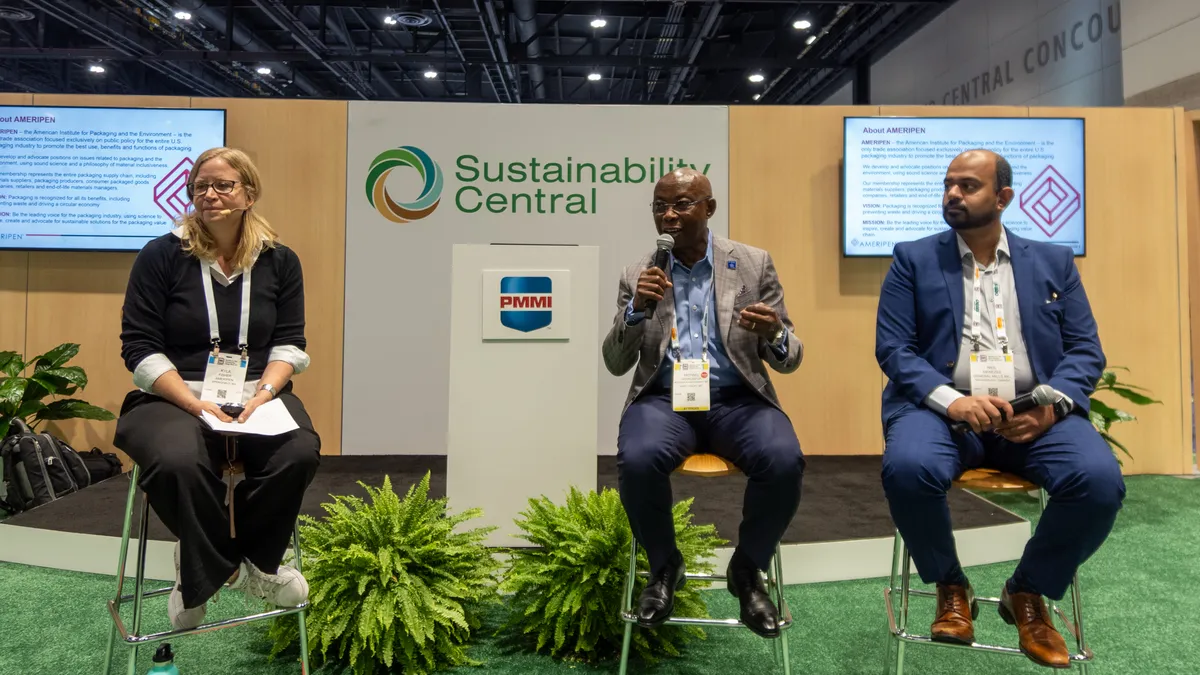Brands, suppliers and other packaging stakeholders in between are still hungry for insights into emerging extended producer responsibility (EPR) for packaging programs. At Pack Expo International, key voices in that state-by-state scale-up sought to educate large attendee crowds about what brands need to know and how suppliers can help.
Michael Okoroafor, chief sustainability officer at seasonings and condiments company McCormick & Co., framed the significance of EPR in the context of climate science and how packaging contributes to scope 3 emissions, which affects consumed packaged goods companies’ 2025 and 2030 emissions reduction commitments.
“If you need to decarbonize the planet, you need to make sure that you decarbonize packaging, and that's why EPR is critical,” he said during a Nov. 5 panel discussion about how suppliers can help brands complying with new EPR programs. This effort requires brand owners, material companies and others, said Okoroafor, who also participates in Maryland’s EPR advisory council.
Neil Menezes, a CPG sustainability professional who also serves as vice chair of the producer responsibility organization Circular Action Alliance, noted there are opportunities for non-producers to get involved with the producer responsibility organization, too. One way is in helping influence ecomodulation as rulemaking occurs for EPR laws that have already passed.
Suppliers will play an important role in helping brand owners source data, noted Menezes, packaging sustainability policy manager at General Mills.
For instance, he said that while companies buy certain materials like films by linear feet, EPR programs work off of weight. Menezes said General Mills has worked closely with suppliers to understand that conversion.
One lesson that Menezes took from experience in Canada, especially with flexible packaging, is that having calculations off by just 5% or 10%, when multiplied by millions of units, can result in paying hundreds of thousands of dollars in extra fees.
General Mills has spent the last four years cleaning up its data, Menezes said.
In a separate presentation, Clorox Packaging & Sustainability Data Steward Kristin Speck detailed the company’s five-year journey to better track and understand its sustainability data amid the passage of state EPR laws. That period has also seen new PCR laws and Clorox joining the voluntary commitment group the U.S. Plastics Pact and being a signatory of the Ellen MacArthur Foundation.
“We are definitely still in the middle of the journey. There's still a lot of work to be done to make sure that we're fully ready for these EPR laws and many more EPR laws that are likely to be passed,” said Speck.
Speck encouraged companies to invest in data professionals and platforms, and embed data into overall processes for packaging development.
“My advice for you, wherever your company might be on your own journey, is to hire data people. You need to invest in people who really understand data,” she said.
Companies must also invest in a data system, she said. “We are far beyond the days of just Excel and putting a whole bunch of people in a room and waiting to get those final numbers. Clorox chose to develop the system internally, but there’s a lot of systems you can purchase that can layer on top and do the same sort of work.”
Suppliers may also be able to help customers navigate EPR based on their experience with such policies in other jurisdictions.
Jason Pelz, vice president of sustainability for Tetra Pak in the U.S. and Canada, shared in a separate interview that, for now, EPR-related conversations with customers center on explaining fundamentals as well as the company’s work to improve the recycling value chain. As a Europe-based company, Tetra Pak is “ahead of the curve” and in a position to provide guidance because it already has experience with EPR, Pelz noted.
EPR isn’t the only important category of legislation that’s on the rise. Ameripen hosted a separate session about packaging policy’s expansion in the United States. While EPR is Ameripen’s top issue, it also engages on state recycled content mandates, recycling and compostability claims and labeling restriction policy, among other areas, explained Membership and Policy Director Rob Keith.
Keith previewed a federal solution Ameripen has been working on, known internally as the Packaging and Claims Knowledge (PACK) Act. The aim is to draft federal language for compostable, recyclable and reusable claims and labeling, and add a new subtitle to the Solid Waste Disposal Act to establish a federal legal framework and standards for such claims in conjunction with consumer product packaging, among other aspects. It would empower the U.S. EPA to administer that framework, Keith said.
“It’s something that we’re going to be pushing pretty actively in 2025,” said Keith.























